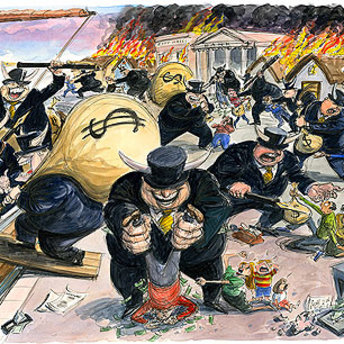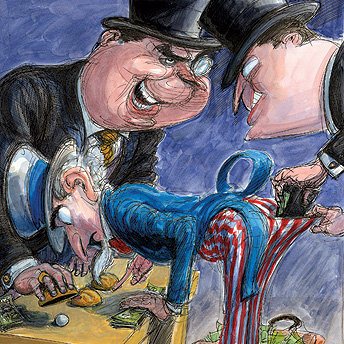Create the Path Forward
Today, Matt Taibbi describes Max Keiser’s proposal that Greece should nationalize their banks, abrogate debts that were criminally originated and work through the painful adjustment of rebuilding their real economy:
Often also called an activist, Mr. Keiser created quite a stir a few days ago when, on an Al Jazeera program, he claimed that Greece, for the past decade, has fallen victim to the “economic terrorists” of the Wall Street banking systems and the IMF. In the interview which followed, he claimed “if the Greeks want to be protected from the IMF, then they should nationalize their banks thus establishing government owned institutions so as to revive the banking system”, while at the same time “ceasing to pay back the loans which were issued illegally” via “cooking the books” of the Greek economy by Goldman Sachs. He proposed the expulsion from the country of American banks as well as the IMF. The consequence will be “two or three years of heavy recession”, during which time Greece will be able “to rebuild its economy”, ensuring its economic independence.
Matt invites comment on the merits of this plan.
Max’s proposal is sound. First, it moves us towards a fundamentally healthy and sound economy. Second, it is in accordance with age old financial and legal principles. If a debt is “fraudulently induced,” it can be invalidated in whole or in part.
Look up “fraudulent inducement.” My position as the former Assistant Secretary of Housing-Federal Housing Commissioner and then as lead financial advisor to the U.S. Department of Housing and Urban Development is that the majority of the mortgages originated in the United States after 1996 were fraudulently induced.
The way to deal with criminals is to treat our contracts with them in a manner reciprocal to how they have treated their contracts with us.
Will a growing movement to abrogate contracts with institutions who have broken the law be disruptive? Yes. Will that require painful adjustments? Yes. That is the price we pay to deal with the challenges we face. This includes the fact that the banks have sold criminally originated debts to our pension funds and retirement accounts as well as to allies and institutions around the world.
Read moreThe Solution For Greece (Max Keiser, Matt Taibbi and Catherine Austin Fitts)


